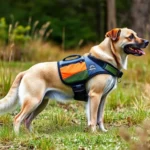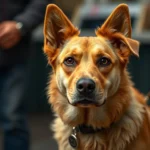
The joy of Easter doesn’t have to be limited to humans; our furry friends can join in on the fun too! An Easter egg hunt for dogs is a delightful way to engage your pet in a festive and exciting activity that taps into their natural instincts. Imagine your dog, tail wagging, as they scamper around searching for hidden treasures. This engaging event not only provides entertainment but also mental stimulation, making it a wonderful addition to your Easter festivities.
Understanding the Concept of Easter Egg Hunts for Dogs
Origin of the Idea
Traditional Easter egg hunts have been a beloved family tradition for generations. Children search for hidden eggs, often filled with candy or small toys, as a way to celebrate the holiday. The concept of adapting this fun activity for dogs stems from the understanding that they too enjoy the thrill of the chase. By creating a dog-friendly egg hunt, pet parents can provide their dogs with an exciting experience that mirrors the joy of these traditional hunts.
Why Dogs Love Egg Hunts
Dogs are naturally curious creatures, driven by their instincts to sniff and explore. An Easter egg hunt for dogs taps into these instincts, allowing them to engage in behaviors that promote mental and physical health. The excitement of discovery, paired with the reward of finding treats, keeps them motivated and entertained. From the thrill of the chase to the satisfaction of a hidden treasure, dogs find endless joy in participating in these hunts.
Planning Your Easter Egg Hunt
Choosing the Right Location
When planning your Easter egg hunt for dogs, selecting the right location is crucial. You have the option of hosting the hunt indoors or outdoors, each with its own advantages and disadvantages.
- Indoor Hunts:
- Pros: Controlled environment, less weather-related concerns.
-
Cons: Limited space may restrict movement, potential hazards like breakables.
-
Outdoor Hunts:
- Pros: More space for running and exploration, natural scents to enhance the experience.
- Cons: Weather factors (rain, heat) can impact the hunt, possible distractions from other animals.
Regardless of the chosen location, ensure it is safe and free from hazards such as sharp objects, toxic plants, or small items your dog might swallow.
Selecting the Right Time
Timing is important in making your Easter egg hunt for dogs successful. Early morning or late afternoon are often the best times, especially for outdoor hunts when temperatures are cooler. Consider weather forecasts and avoid times when it may be too hot or rainy. A little planning can ensure an enjoyable experience for both you and your dog.
Preparing for the Egg Hunt
Choosing the Right “Eggs”
The next step in planning is choosing the right “eggs” for your hunt. For dogs, you will want to select items that are safe and enticing.
-
Plastic Eggs: These are great as they can be filled with treats. Ensure they are sturdy enough to withstand your pup’s excitement.
-
Treat-Filled Options: You can buy ready-made treat-filled eggs or create your own by filling empty plastic eggs with dog-friendly goodies.
-
DIY Ideas: Consider decorating cardboard boxes or using other containers that your dog can safely open.
Filling the Eggs
What you fill your eggs with is just as important as the eggs themselves.
-
Types of Treats: Use a mix of kibble, special dog treats, or even small toys. Consider your dog’s dietary needs and preferences when choosing treats.
-
Balancing Healthy and Indulgent Treats: While it’s tempting to fill eggs with all kinds of goodies, moderation is key. Mix healthier options with a few indulgent treats to keep things exciting without overwhelming your dog’s diet.
Setting Up the Hunt
Once you’ve chosen your eggs and filled them, it’s time to set up the hunt.
-
Hiding the Eggs: Place the eggs in various locations to keep your dog engaged. Consider height and difficulty; higher spots may be easier for larger breeds and harder for smaller ones.
-
Creating a Map or Clues: For a more advanced hunt, consider drawing a simple map or writing clues that guide your dog to the eggs. This adds an additional layer of fun and encourages problem-solving.
Engaging Your Dog During the Hunt
Training Your Dog for the Hunt
Before the actual hunt begins, it can be beneficial to train your dog with some basic commands.
-
Basic Commands: Teaching commands like “find it” or “search” can help your dog understand what to do during the hunt.
-
Using Encouragement and Rewards: Use positive reinforcement to encourage your dog to search for the eggs. Praise them enthusiastically when they find one!
Incorporating Challenges
For dogs that are more experienced or energetic, consider adding challenges to the hunt.
-
Scent Trails: Use scent trails leading to the eggs to engage your dog’s powerful sense of smell. This can make the hunt more challenging and stimulating.
-
Incorporating Toys or Puzzles: You can also hide toys or puzzles among the eggs to add variety and keep your dog engaged longer.
Post-Hunt Activities
Celebrating Success
After the hunt, it’s important to celebrate your dog’s success.
-
Ideas for Rewarding Your Dog: Offer your dog their favorite treat, or spend some quality time playing with them. This reinforces the fun of the hunt and strengthens your bond.
-
Importance of Praise and Treats: Consistent praise can enhance your dog’s enjoyment and motivation for future hunts, making them more eager to participate next time.
Health and Safety Considerations
As with any activity, monitoring your dog’s health and safety is essential.
-
Checking for Overeating: After the egg hunt, be mindful of how many treats your dog consumes. Too many treats can lead to upset stomachs or other health issues.
-
Ensuring All Eggs Are Collected: Make sure to collect all hidden eggs after the hunt. This prevents your dog from accidentally swallowing anything harmful.
Making It a Fun Tradition
Creating Lasting Memories
An Easter egg hunt for dogs can become a cherished family tradition.
-
Tips for Capturing Photos and Videos: Set up a designated area for photos before the hunt starts. Capture candid moments of your dog searching for eggs, and consider taking a few posed photos afterwards.
-
Sharing Experiences on Social Media: Use social media to share your adventures. Not only does this let you connect with other pet owners, but it also inspires others to create their own dog-friendly hunts.
Involving Friends and Family
Consider making the Easter egg hunt for dogs a community event.
-
Ideas for Group Egg Hunts: Invite friends and their dogs to join in on the fun. This will create a lively atmosphere and provide an opportunity for socialization.
-
Including Other Pets: If you have multiple pets, consider ways to adapt the hunt for them as well. Tailor the hunt to different skill levels and preferences to ensure everyone has fun.
Conclusion
Hosting an Easter egg hunt for dogs is a wonderful way to celebrate the holiday while providing your furry friend with mental and physical stimulation. Not only does it cater to their natural instincts, but it also allows for quality bonding time between you and your pet.
Encouraging engagement through fun activities enriches your dog’s life and creates lasting memories for both of you. So this Easter, consider planning your own egg hunt for dogs, and enjoy the laughter and joy it brings! Share your experiences and tips with others, as every hunt is a unique adventure waiting to be explored.









